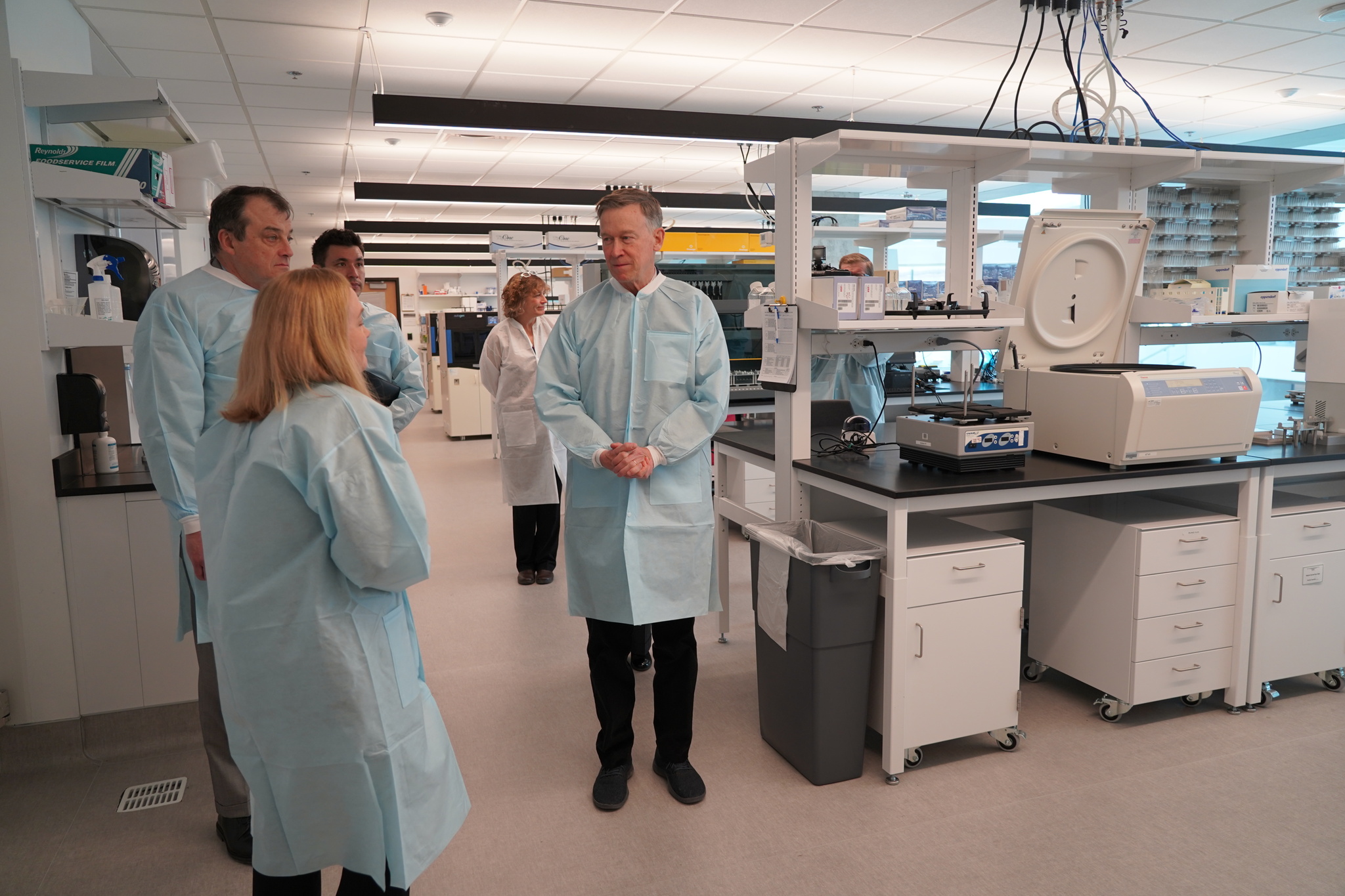Campus stop includes tour of Colorado Center for Personalized Medicine Biobank Lab
U.S. Sen. John Hickenlooper visited the University of Colorado Anschutz Medical Campus on April 14, hearing from CU and UCHealth leaders on how they joined efforts in the battle against COVID-19 and touring the new Anschutz Health Sciences Building (AHSB). The senator's aim was to take lessons learned back to the U.S. Capitol to help guide legislation and manage the country's future health crises.
A tour of the Colorado Center for Personalized Medicine's Biobank in its new AHSB home helped set the stage for the former Colorado governor on how a collaborative campus effort helped steer the pandemic's direction in the state.
Led by center Director Kristy Crooks, PhD, the tour focused on the Biobank, a biorepository created through a CU Anschutz and UCHealth partnership and integral to research and patient care since the start of the pandemic. Hickenlooper was updated on that work and how the new location and continued partnership provides a great opportunity for future advancements in genomics and in treating future diseases.
 Sen. Hickenlooper tours the new Biobank facilities with Director Kristy Crooks, PhD, and University of Colorado School of Medicine Dean John J. Reilly, MD. |
Following the tour, Hickenlooper sat down with CU Anschutz and UCHealth leaders for an hour-long discussion on the campus-wide COVID-19 response. Moderated by Chancellor Don Elliman - and joined by University of Colorado School of Medicine Dean John J. Reilly, MD; Elizabeth Concordia, UCHealth president and CEO; and Tom Gronow, EdD, president and CEO of University of Colorado Hospital - the conversation centered on three primary areas: teamwork, collective communication and data.
Talk focuses on past successes, future needs
Leaders highlighted efforts in effective patient-care coordination, from front-line emergency department care to agile and advanced telehealth. Fast-tracked clinical trials and streamlined collaborations added to the many ways CU Anschutz saved lives during the pandemic, the campus leaders said. Experts also outlined the importance of bioinformatics and data exchange in responding to future pandemics.
The group also provided Hickenlooper some of the ongoing challenges of COVID-19, particularly a backlog of elective health screening that patients put off over the last two years and public health communications hurdles around vaccine hesitancy.
Hickenlooper is sponsoring two bills in Congress to help bring changes and resources to better respond to future pandemics - the Early Countermeasure Discovery Act and Modernizing Biosurveillance Capabilities and Epidemic Forecasting Act. Both measures are part of the Prepare for and Respond to Existing Viruses, Emerging New Threats (PREVENT) Pandemics Act, comprehensive, bipartisan legislation focused on retooling the nation's public health and medical preparedness infrastructure in the wake of COVID-19.
CU Anschutz participants included David Beckham, MD, associate professor of medicine; Thomas Flaig, MD, vice chancellor for research; Melissa Haendel, PhD, chief research informatics officer; Ross Kedl, PhD, professor of immunology and microbiology; Richard Zane, MD, chair of emergency medicine; and Jonathan Samet, MD, dean of the Colorado School of Public Health.
Photos Credit: Michael Judson






